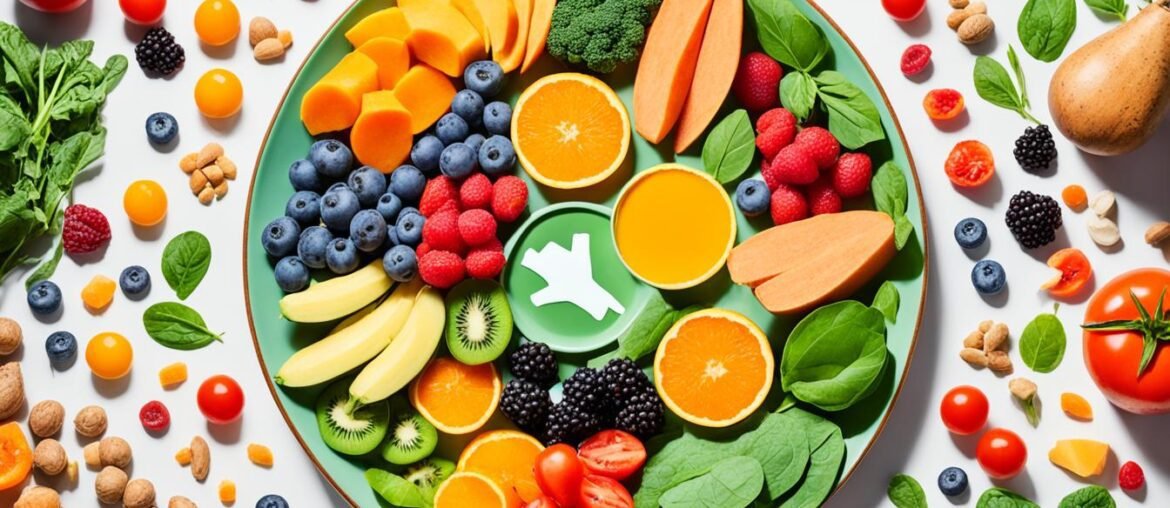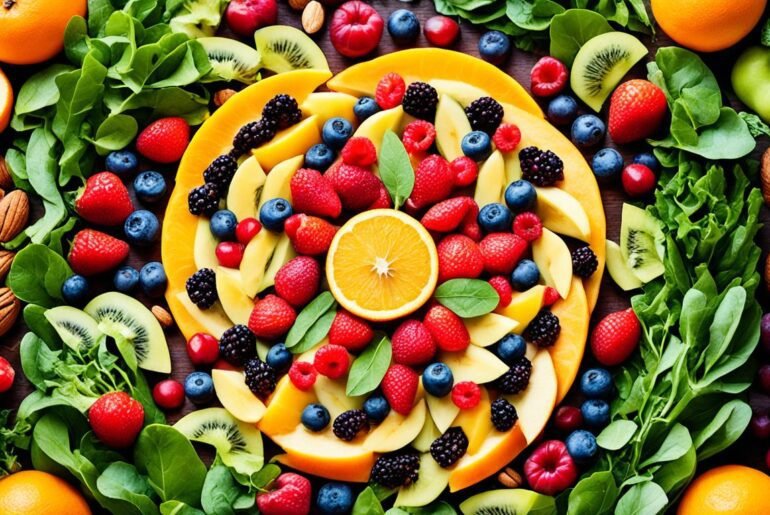Did you know that the food you eat can have a direct impact on the aging process of your skin? It’s true! The right nutrition plan for anti-aging skin care can help maintain youthful-looking skin and promote healthy aging. By addressing factors such as oxidation, inflammation, and glycation through a balanced diet, you can support skin health and protect against the main causes of skin aging.
Key Takeaways:
- An anti-aging diet can address factors that contribute to skin aging, such as oxidation, inflammation, and glycation.
- A nutrition plan rich in antioxidants, healthy fats, and essential nutrients can support skin health and protect against oxidative stress.
- Following an anti-aging diet can help prevent glycation, fight oxidation, and soothe inflammation.
- Foods such as almonds, with their high levels of vitamin E and linoleic acid, can be particularly beneficial for skin health.
- Avoiding high-glycemic load foods, added sugars, and refined carbohydrates can help maintain the health and vitality of your skin.
What Causes Aging?
Aging is a natural process that affects all organs, including the skin. Skin aging can be categorized into two types: chronological aging and photoaging. Chronological aging is the result of the passage of time and genetic factors, while photoaging is caused by UV light exposure. Both types of aging lead to skin issues such as dryness, dullness, lack of elasticity, fine wrinkles, and age spots.
Biological processes like oxidation, inflammation, and glycation play a role in skin aging and can be influenced by the food we eat.
“Aging is a fact of life. Looking your age is not.” – Dr. Howard Murad
Chronological Aging
Chronological aging is an intrinsic process that occurs naturally over time. It is influenced by genetic factors and the progressive decline in the production of collagen and elastin, the proteins responsible for skin’s firmness and elasticity. As we age, the skin becomes thinner, drier, and less resilient, leading to the formation of wrinkles and sagging.
Photoaging
Photoaging, on the other hand, is caused by prolonged exposure to UV light from the sun or artificial tanning devices. UV rays penetrate the skin, damaging collagen fibers, impairing the skin’s ability to repair itself, and triggering inflammatory responses. This results in premature aging signs such as wrinkles, age spots, and a rough texture.
Biological Processes
Biological processes like oxidation, inflammation, and glycation play a significant role in skin aging.
| Process | Description |
|---|---|
| Oxidation | Occurs when free radicals are produced in the body, leading to cellular damage and accelerated aging. |
| Inflammation | Chronic inflammation can break down collagen and elastin fibers, resulting in wrinkles and sagging skin. |
| Glycation | It is a process in which sugar molecules bind to proteins, causing the formation of advanced glycation end products (AGEs), which can lead to collagen stiffness and sagging skin. |
Understanding these processes and their impact on skin aging is crucial for implementing effective anti-aging strategies. By addressing these factors and making dietary choices that combat oxidative stress, inflammation, and glycation, we can support healthy aging and maintain youthful-looking skin.
How Does an Anti-Aging Diet Work?
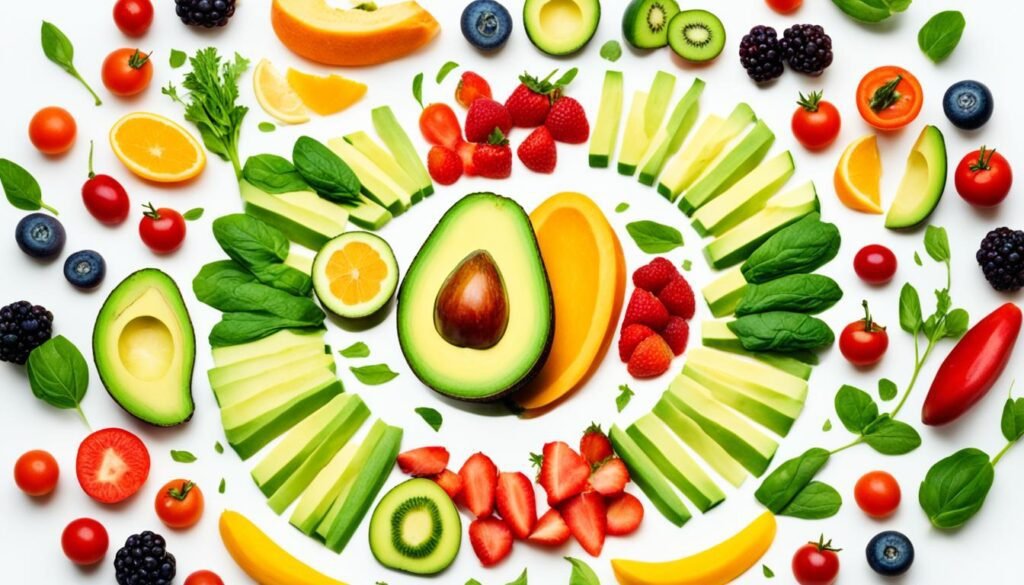
An anti-aging diet is supported by scientific research and can help improve skin health. The diet works by preventing glycation, a process in which sugar molecules bind to proteins or fats, leading to collagen stiffness and sagging. Certain foods and eating patterns can help prevent glycation. The diet also fights oxidation, which causes damage to the skin. Eating foods rich in antioxidants can help combat oxidative stress and protect the skin. Additionally, the diet aims to soothe inflammation, which can break down collagen and lead to wrinkling. Including anti-inflammatory foods and dietary compounds can help protect the skin’s structure and elasticity.
An anti-aging diet focuses on nourishing the body with specific nutrients that promote skin health and combat aging. By incorporating the right foods into your diet, you can support the natural processes of glycation prevention, oxidation fighting, and inflammation soothing.
Preventing Glycation
Glycation is a natural process that occurs when sugar molecules bind to proteins or fats in the body. This process can result in the formation of advanced glycation end products (AGEs), which contribute to collagen stiffness and sagging. To help prevent glycation, it is important to consume a diet low in refined sugars and processed carbohydrates. Opt for foods with a low glycemic index, such as whole grains, legumes, and non-starchy vegetables. These foods have a slower impact on blood sugar levels, reducing the risk of glycation.
Fighting Oxidation
Oxidation is a process that generates free radicals, which can damage cells and tissues, including the skin. Antioxidants play a crucial role in fighting oxidation by neutralizing free radicals. Include foods rich in antioxidants, such as berries, leafy greens, and nuts, in your anti-aging diet. These foods provide a wide range of antioxidants, such as vitamins C and E, which can help protect the skin from oxidative stress.
Soothing Inflammation
Inflammation is a natural response that helps the body heal, but chronic inflammation can contribute to skin aging. Some foods, such as fatty fish (salmon, mackerel), turmeric, and green tea, have anti-inflammatory properties. Including these foods in your diet can help reduce inflammation and promote healthier skin.
By following an anti-aging diet that focuses on glycation prevention, oxidation fighting, and inflammation soothing, you can support your skin’s health and promote a more youthful appearance.
Anti-Aging Diet: What to Eat
To support skin health and combat aging, it is recommended to follow a low-glycemic load diet. This involves consuming fewer refined carbohydrates and processed foods, and instead opting for lean protein, fiber-rich carbohydrates, and healthy fats. Foods with a low glycemic index help maintain steady blood sugar levels, which can prevent glycation. Healthy fats, such as those found in oily fish, nuts, and seeds, provide essential nutrients for the skin. Red, orange, yellow, and green fruits and vegetables are rich in carotenoids, which protect the skin from UV damage. Staying hydrated by consuming water-rich foods like watermelon and enjoying herbal tea can also support skin health.
Low-Glycemic Load Diet
A low-glycemic load diet focuses on choosing foods that have a minimal impact on blood sugar levels. By prioritizing low-glycemic index foods, you can help prevent glycation, a process in which sugar molecules bind to proteins or fats, leading to collagen stiffness and sagging. Some examples of low-glycemic load foods include:
- Leafy green vegetables
- Cruciferous vegetables, such as broccoli and cauliflower
- Berries
- Whole grains, such as quinoa and brown rice
By including these foods in your diet, you can maintain more stable blood sugar levels and support skin health.
Healthy Fats
Healthy fats are essential for the skin’s health and appearance. They provide vital nutrients and contribute to the skin’s natural moisture barrier. Incorporating sources of healthy fats, such as:
- Oily fish, like salmon and sardines
- Nuts, such as almonds and walnuts
- Seeds, like flaxseeds and chia seeds
- Avocado
can help nourish the skin from within and maintain its elasticity and suppleness.
Colorful Fruits and Vegetables
Red, orange, yellow, and green fruits and vegetables are packed with antioxidants, vitamins, and minerals that promote skin health. These vibrant-colored produce contain carotenoids, such as:
- Tomatoes
- Carrots
- Oranges
- Spinach
Carotenoids help protect the skin from UV damage and contribute to a radiant complexion. Including a variety of these colorful fruits and vegetables in your meals can provide numerous skin benefits.
Hydration
Staying hydrated is crucial for maintaining optimal skin health. Consuming water-rich foods, like:
- Watermelon
- Cucumbers
- Oranges
and enjoying herbal tea can help keep your skin hydrated and supple.
Remember to nourish your body with a variety of whole foods and prioritize these key components in your anti-aging diet for optimal skin health and overall well-being.
Special Mention: Almonds

When it comes to promoting skin health, almonds deserve a special mention. These tasty nuts are packed with essential nutrients that can benefit your skin and help combat the signs of aging.
Almonds are a rich source of omega-6 fats, which play a crucial role in maintaining skin elasticity and hydration. Additionally, they contain high levels of vitamin E, a powerful antioxidant that helps prevent collagen breakdown, a key factor in maintaining youthful-looking skin.
A study conducted on postmenopausal women found that daily consumption of almonds resulted in less severe wrinkles and improved overall skin condition. This can be attributed to the combination of vitamin E and linoleic acid present in almonds, which work together to nourish and protect the skin.
Adding almonds to your diet is a simple and delicious way to support your skin health. Whether enjoyed as a snack, sprinkled on top of salads, or incorporated into recipes, these nutrient-packed nuts can make a significant difference in maintaining the youthful glow of your skin.
| Nutrient | Amount per 100g |
|---|---|
| Calories | 579 |
| Protein | 21.2g |
| Fat | 49.9g |
| Carbohydrates | 21.6g |
| Vitamin E | 25.63mg |
| Linoleic Acid (Omega-6) | 12.44g |
What Not to Eat
To support anti-aging skin care, it is important to limit the consumption of high-glycemic load foods, added sugars, refined carbohydrates, and deep-fried foods. These types of foods can have negative effects on your skin and overall health. Let’s take a closer look at why you should avoid them:
High-Glycemic Load Foods
High-glycemic load foods are quickly digested and cause a rapid rise in blood sugar levels. This spike in blood sugar can trigger a process called glycation, where sugar molecules bind to proteins in your body, including collagen. Over time, glycation can lead to collagen damage, which can result in wrinkling and sagging of the skin. Avoiding high-glycemic load foods can help prevent these effects.
Added Sugars
Added sugars are commonly found in processed foods, sugary drinks, and desserts. Consuming excessive amounts of added sugars can contribute to inflammation in the body, including the skin. Chronic inflammation can break down collagen and elastin, essential proteins that keep your skin firm and elastic. Limiting your intake of added sugars can help maintain the health and integrity of your skin.
Refined Carbohydrates
Refined carbohydrates, such as white bread, white rice, and sugary cereals, are stripped of their natural fiber and nutrients. These carbohydrates are quickly digested and can cause a rapid increase in blood sugar levels, similar to high-glycemic load foods. They can also contribute to inflammation and glycation processes, negatively impacting the health and appearance of your skin. Choosing whole grains and fiber-rich carbohydrates is a better option for supporting skin health.
Deep-Fried Foods
Deep-fried foods, such as french fries, fried chicken, and doughnuts, are cooked in oils at high temperatures. The process of deep-frying can produce harmful substances, including advanced glycation end products (AGEs). These AGEs can accelerate the aging process by damaging collagen and elastin in the skin. To maintain the health and vitality of your skin, it is best to avoid deep-fried foods.
By avoiding high-glycemic load foods, added sugars, refined carbohydrates, and deep-fried foods, you can help protect your skin from the damaging effects of glycation, inflammation, and collagen breakdown. Instead, focus on a diet rich in whole foods, lean proteins, healthy fats, and plenty of fruits and vegetables to nourish your skin from within.
The Power of Phytonutrients
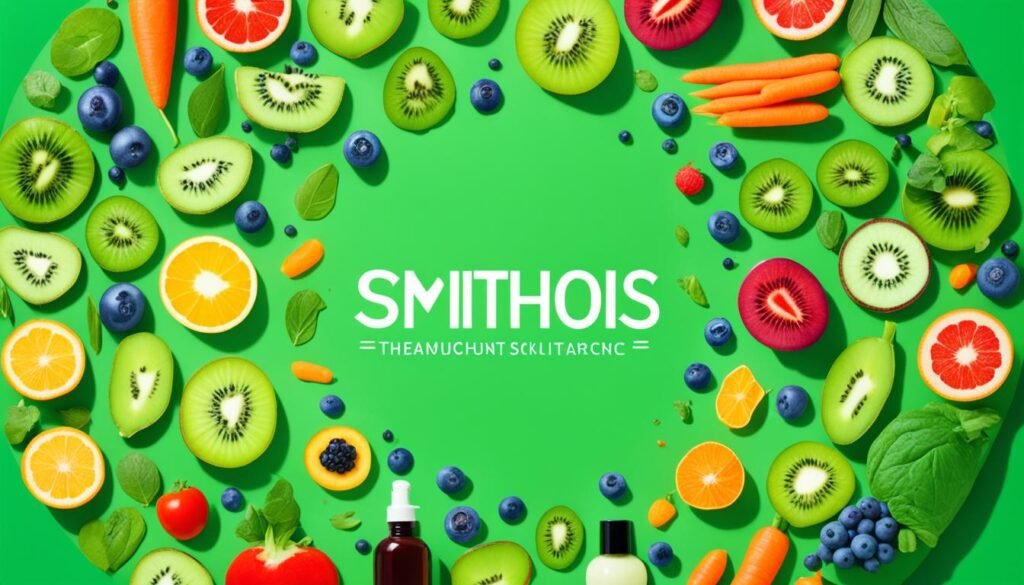
Phytonutrients, such as antioxidants, flavanols, catechins, and resveratrol, play a crucial role in supporting skin health and fighting against aging. These powerful compounds can be found in various foods and have been shown to provide numerous benefits for the skin.
Flavanols in Cocoa
Flavanols, found in cocoa, are potent antioxidants that help protect the skin from oxidative stress. Research has shown that consuming cocoa can improve skin hydration, increase blood flow, and enhance skin density and thickness. It also has the potential to reduce skin roughness and improve overall skin appearance.
Catechins in Green Tea
Catechins, particularly abundant in green tea, have been widely studied for their skin-protective effects. These antioxidants help reduce inflammation, boost collagen production, and protect against UV damage. Regular consumption of green tea has been linked to smoother skin texture, improved elasticity, and a reduction in fine lines and wrinkles.
Resveratrol in Peanuts and Grapes
Resveratrol, found in peanuts and grapes, is a phytonutrient that has gained attention for its potential anti-aging properties. It acts as an antioxidant, helping to neutralize free radicals and reduce inflammation. Studies have suggested that resveratrol may have a protective effect against UV-induced skin damage and can help maintain skin elasticity and firmness.
“Phytonutrients like flavanols, catechins, and resveratrol have been shown to boost antioxidant enzymes, reduce inflammation, and protect against UV damage.”
While research in this area is ongoing, incorporating a variety of colorful fruits and vegetables into your diet can provide a wide range of phytonutrients that support skin health. By including these plant-based compounds in your meals, you can nourish your skin from within and promote a radiant, youthful complexion.
| Phytonutrient | Sources | Benefits |
|---|---|---|
| Flavanols | Cocoa | Antioxidant, improve skin hydration, increase blood flow |
| Catechins | Green tea | Reduce inflammation, boost collagen production, UV protection |
| Resveratrol | Peanuts, grapes | Antioxidant, reduce inflammation, protect against UV damage |
Remember to consult with a healthcare professional before making any significant changes to your diet. Every individual’s nutritional needs may vary.
Proactive Steps for Anti-Aging

In addition to following an anti-aging diet, there are other proactive steps you can take to support skin health and combat aging. By incorporating these steps into your routine, you can enhance the benefits of an anti-aging lifestyle and promote a youthful appearance.
Sun Protection
Protecting your skin from the harmful effects of the sun is essential for healthy aging. Exposure to UV rays can lead to premature aging, including wrinkles, age spots, and a loss of elasticity. Make sure to apply sunscreen with a high SPF before heading outdoors, wear protective clothing, and seek shade during peak sun hours.
Balance
Achieving a balanced lifestyle is crucial for overall well-being, including the health of your skin. Balance your diet by consuming a variety of nutrient-rich foods, ensuring that you get all the necessary vitamins, minerals, and antioxidants. Additionally, aim for a healthy work-life balance and prioritize self-care to reduce stress and improve mental well-being.
Exercise
Regular physical activity not only keeps your body in shape but also promotes skin health. Exercise improves blood circulation, which helps deliver oxygen and nutrients to the skin, giving it a vibrant, youthful glow. Incorporate both cardiovascular exercises and strength training into your routine for optimal results.
Stress Management
Effective stress management techniques can reduce the impact of stress on your skin. Chronic stress can accelerate the aging process and contribute to skin problems like acne and eczema. Practice relaxation techniques such as deep breathing, meditation, or yoga to relieve stress and promote a calm mind and body.
By adopting these proactive steps, including sun protection, balancing lifestyle factors, regular exercise, and effective stress management, you can support your skin’s health and unlock the full potential of your anti-aging regimen.
The Role of Diet in Overall Wellness
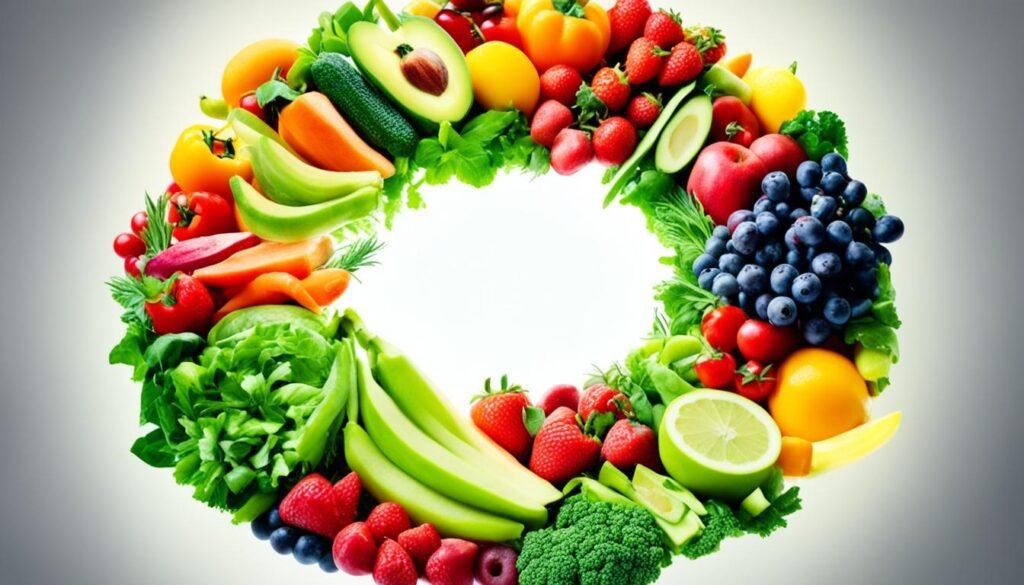
The impact of diet extends beyond just skin health. It plays a significant role in supporting overall health and mental well-being. When we consume foods that are rich in antioxidants, healthy fats, and essential nutrients, we nourish our bodies from the inside out, promoting a healthy and radiant complexion.
Eating a nutritious diet contributes to our internal health, which is often reflected in the condition of our skin. By focusing on nutrition, we not only care for our skin but also promote overall wellness.
Ensuring that our diet is balanced and packed with the right nutrients helps support various bodily functions, including the immune system, digestion, and energy levels. A healthy diet also provides the necessary building blocks for the production of enzymes, hormones, and neurotransmitters that affect our mental well-being. When we fuel our bodies with the right foods, we enhance both our physical and mental vitality.
By prioritizing a diet that is optimized for overall health, we set ourselves up for success in all areas of life. Taking the time to select nutrient-dense foods supports our internal organs, strengthens our immune system, and helps us maintain a positive mindset.
“Let food be thy medicine and medicine be thy food.” – Hippocrates
An optimized diet not only benefits our skin but also provides the foundation for a healthier, more vibrant life. It’s a holistic approach that recognizes the interconnectedness of our physical and mental well-being. So, let’s make conscious choices to nourish our bodies and promote overall wellness.
Conclusion
Following a nutrition plan for anti-aging skin care is crucial in maintaining youthful-looking skin and supporting healthy aging. By incorporating foods that promote collagen production, fight oxidation and inflammation, and protect against glycation, you can nourish your skin from within.
Additionally, adopting a balanced lifestyle and practicing sun protection can further enhance the benefits of an anti-aging diet. Remember that beautiful, glowing skin starts with what you eat, so make conscious choices to support your skin health and overall well-being.
Investing in your skin health and nutrition is an investment in yourself. By prioritizing anti-aging skin care and following a recommended nutrition plan, you can achieve the radiant, youthful-looking skin you desire while promoting healthy aging. Take charge of your skin’s health today and enjoy the benefits of a nourished and vibrant complexion.
FAQ
What is an anti-aging diet?
An anti-aging diet refers to a nutrition plan that helps maintain youthful-looking skin and supports healthy aging. It involves consuming foods that promote collagen production, fight oxidation and inflammation, and protect against glycation.
What causes skin aging?
Skin aging can be categorized into chronological aging, which is the result of the passage of time and genetic factors, and photoaging, which is caused by UV light exposure. Factors such as oxidation, inflammation, and glycation also play a role in skin aging.
How does an anti-aging diet work?
An anti-aging diet works by preventing glycation, fighting oxidation, and soothing inflammation. It does so by including foods that prevent sugar molecules from binding to proteins or fats, providing antioxidants to combat oxidative stress, and incorporating anti-inflammatory foods and dietary compounds.
What foods should be included in an anti-aging diet?
An anti-aging diet should include foods with a low glycemic index, such as lean protein, fiber-rich carbohydrates, and healthy fats. It should also incorporate fruits and vegetables rich in carotenoids, which protect the skin from UV damage, and promotes hydration through water-rich foods and herbal tea.
Are almonds good for skin health?
Yes, almonds are particularly beneficial for skin health. They contain high levels of vitamin E, an antioxidant that helps prevent collagen breakdown. The combination of vitamin E and linoleic acid found in almonds helps maintain skin elasticity and hydration.
What foods should be avoided for anti-aging skin care?
It is important to limit the consumption of high-glycemic load foods, added sugars, and refined carbohydrates. Deep-fried foods should also be avoided as they can damage collagen.
What are phytonutrients and their role in anti-aging?
Phytonutrients are compounds found in plants that play a crucial role in supporting skin health and fighting against aging. Examples include flavanols in cocoa, catechins in green tea, and resveratrol in peanuts and grapes. These compounds boost antioxidant enzymes, reduce inflammation, and protect against UV damage.
What other proactive steps support anti-aging?
In addition to following an anti-aging diet, it is important to practice sun protection to prevent UV damage. Balancing lifestyle factors such as exercise and stress management can also contribute to healthy aging. Regular physical activity improves circulation and promotes skin health, while effective stress management reduces the impact of stress on the skin.
Does diet impact overall wellness?
Yes, diet plays a significant role in overall health and mental well-being. The skin is often a reflection of internal health, and nourishing the body with the right foods can contribute to a healthy, radiant complexion.
How can an anti-aging diet support healthy aging?
Following a nutrition plan for anti-aging skin care can have a significant impact on maintaining youthful-looking skin and supporting healthy aging. By incorporating foods that promote collagen production, fight oxidation and inflammation, and protect against glycation, you can nourish your skin from within and promote overall wellness.

